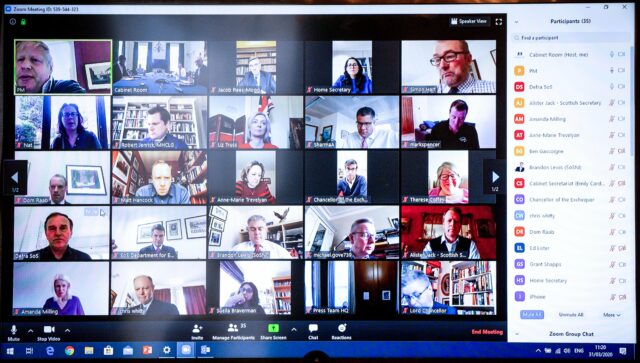Any casual reader of trivia will be aware that I care about my privacy and that I go to some lengths to maintain that privacy in the face of concerted attempts by ISPs, corporations, government agencies and others to subvert it. In particular I use personally managed OpenVPN servers at various locations to tunnel my network activity and thus mask it from my ISP’s surveillance. I also use Tor (over those same VPNs), I use XMPP (and latterly Signal) for my messaging and my mobile ‘phone is resolutely non-google because I use lineageos‘ version of android (though that still has holes – it is difficult to be completely free of google if you use an OS developed by them). Unfortunately my email is still largely unprotected, but I treat that medium as if it were correspondence by postcard and simply accept the risks inherent in its use. I like encryption, and I particularly like strong encryption which offers forward secrecy (as is provided by TLS, and unlike that offered by PGP) and will therefore use encryption wherever possible to protect my own and my family member’s usage of the ‘net.
Permanent link to this article: https://baldric.net/2020/05/06/encrypting-dns/
Apr 10 2020
zooming in on china
Since my previous post below, I have been reading up on Zoom as a company, its staffing and its worrying security (or rather lack of) track record. When I wrote the initial post I said that “Zoom is a US company funded almost entirely by venture capital. Its servers are US based.”. It appears that is not entirely accurate. Indeed, it would appear that some of its servers are actually based in China, furthermore, a large number of its development staff are Chinese nationals, also based in China. And the CEO, Eric S Yuan grew up in China. On a Zoom blog post dated 26 February of this year Yuan wrote:
“I grew up in the eastern Shandong Province of China and studied at the Shandong University of Science & Technology. It’s a place I still hold dear. I am continuously inspired by the courageous efforts of those treating patients in China and around the world — working hard to try to further prevent the spread of the virus.”
Permanent link to this article: https://baldric.net/2020/04/10/zooming-in-on-china/
Apr 03 2020
zooming in on cabinet
On Tuesday of this week, Boris Johnson tweeted a picture of what he called the UK’s “first ever digital Cabinet”. That picture (copy below) shows that the Cabinet meeting was held using Zoom – the sort of video conferencing software which is currently popular with business users forced to work at home during the Covid19 pandemic.
Permanent link to this article: https://baldric.net/2020/04/03/zooming-in-on-cabinet/
Mar 11 2020
beware the zombie apocalypse
Tom Scott is a young educational entertainer who publishes fairly regularly on youtube. Back in mid 2004, whilst still a linguistics student at York, he managed to upset both the Home Office and the Cabinet Office by publishing a Department of Vague Paranoia website spoofing the rather po faced official “Preparing for Emergencies” site. Tom’s website is still in operation – unlike the official one. I guess Tom never aspired to a career in the Civil Service.
Permanent link to this article: https://baldric.net/2020/03/11/beware-the-zombie-apocalypse/
Feb 27 2020
have I been pwned?
Well, I don’t think so. But for a while I was not entirely sure.
Following the move last November of trivia from a VM on UK2’s datacentre in London to our new home on a faster VM on ITLDC’s network I have been making a variety of minor changes and doing some essential housework. One of the biggest changes of course (fortunately for me as it turns out) was the complete separation of my two main services (mail and web) onto different VMs in different countries. My mailserver is now housed in Nuremburg where I have made some additional changes (for example I now run opendkim on it). This VM in Prague now houses just my webserver and of course is home to this blog.
Permanent link to this article: https://baldric.net/2020/02/27/have-i-been-pwned/
Jan 22 2020
TLS certificate checks
My move of trivia to a new VM last December prompted me to look again at my server configuration. In particular I wanted to ensure that I was properly redirecting all HTTP requests to HTTPS and that the ciphers and protocols I support are as up to date and strong as possible. Mozilla offers a very good security reference site which should be your first port of call if you care about server side security. The “cheat sheet” on that site gives pointers to existing good practice guidelines for most of the configuration options you should care about on a modern website. I have implemented as many of these as is possible on trivia – but I am hampered slightly by the fact that I still use WordPress as my blogging platform. WordPress (and its myriad plugins) still does lots of things I don’t actually like (such as setting cookies I can’t control, loading google fonts etc.) but I’m stuck with that unless I change platform (which I might).
Permanent link to this article: https://baldric.net/2020/01/22/tls-certificate-checks/
Jan 14 2020
do not ask me for guest posts or links
For the past four years or so I have been receiving increasingly frequent requests for either guest posts, or links to external sites (or sometimes both). The requests have increased in number ever since I started posting about my use of OpenVPN. Many of these requests want me to point to their commercial VPN site. The requests all look something like this:
Hi.
My name is Foo. I represent Bar. I found your blog on google and read your article on “X”. I think your readers will like our discussion about “X” on our site. Would you be willing to host a guest post by us, or one of our affiliates, promoting the use of “Y”? It would also be really good if you could link to our site from your article.
We are really flexible, so we could totally negotiate about special deals.
Permanent link to this article: https://baldric.net/2020/01/14/do-not-ask-me-for-guest-posts-or-links/
Jan 14 2020
retiring the slugs
I first started using Linksys NSLU2s (aka “slugs”) in early 2008. Back then I considered them quite useful and I even ran webservers and local apt-caches on them. But realistically they are (and even then, were) a tad underpowered. Worse, since Debian on the XScale-IXP42x hasn’t been updated for several years, the slugs are probably vulnerable to several exploits. The latest version of Debian available for the slugs is probably that which I have running (“uname -a” shows “Linux slug 3.2.0-6-ixp4xx #1 Debian 3.2.102-1 armv5tel”).
Permanent link to this article: https://baldric.net/2020/01/14/retiring-the-slugs/
Dec 05 2019
welcome to prague
As of today we are now fully functional in our new home in a datacentre in Prague. We also have a new letsencypt certificate. If you see any problems, let me know at the usual email address.
Enjoy
Permanent link to this article: https://baldric.net/2019/12/05/welcome-to-prague/
Nov 28 2019
a bargain VPS
I have been using services from ITLDC for about three years now. I initially picked one of their cheap VMs based in the Netherlands whilst I was expanding my VPN usage, and frankly, I was not expecting much in the way of customer service or assistance for the very low price I paid. After all I thought, you can’t expect much for under 3 euros a month. But I was pleasantly surprised to find that not only was the actual service pretty rock solid, but so was the help I received on the one or two occasions I had a problem. In fact I have never had to wait more than a few minutes for a response to a ticket. That is exceptional in my experience. For the last year or more, I have been using one of their VMs as an unbound DNS server and VPN endpoint.
So when I was considering a new VM I was very pleasantly surprised to note that ITLDC were offering a huge discount on new servers as part of a “black friday” promotion. I have now paid for a new debian server, based in Prague. That VM is one of their 2 Gig SSD offerings (2 Gb RAM, dual core, 15 Gb disk and unlimited traffic). Even at their normal undiscounted rate that would only have cost me 65.99 euros for a year. I paid the princely sum of 26.39 euros – a 60% discount.
Absolutely astounding value for money. Go get one before the offer runs out.
Permanent link to this article: https://baldric.net/2019/11/28/a-bargain-vps/
Permanent link to this article: https://baldric.net/2019/07/23/fsckd/
Jul 15 2019
more password stupidity
A recent exchange of email with an old friend gave me cause to revisit on-line password/passphrase generators. I cannot for the life of me imagine why anyone would actually use such a thing, but there are a surprisingly large number out there. On the upside, most of these now seem to use TLS encrypted connections so at least the passwords aren’t actually passed back to the requester in clear, but the downside is that most generators are still woefully stupid.
I particularly liked this bonkers example:
Permanent link to this article: https://baldric.net/2019/07/15/more-password-stupidity/
Jul 10 2019
add my name to the list
At the tail end of last year, Crispin Robinson and Ian Levy of GCHQ published a co-authored essay on “suggested” ways around the “going dark problem” that strong encryption in messaging poses Agencies such as GCHQ and its (foreign) National equivalents. In that essay, the authors were at pains to state that they were not in favour of weakening strong encryption, indeed they said:
The U.K. government strongly supports commodity encryption. The Director of GCHQ has publicly stated that we have no intention of undermining the security of the commodity services that billions of people depend upon and, in August, the U.K. signed up to the Five Country statement on access to evidence and encryption, committing us to support strong encryption while seeking access to data. That statement urged signatories to pursue the best implementations within their jurisdictions. This is where details matter, so with colleagues from across government, we have created some core principles that will be used to set expectations of our engagements with industry and constrain any exceptional access solution. We believe these U.K. principles will enable solutions that provide for responsible law enforcement access with service provider assistance without undermining user privacy or security.
Permanent link to this article: https://baldric.net/2019/07/10/add-my-name-to-the-list/
Jul 07 2019
openvpn clients on pfsense
In my 2017 article on using OpenVPN on a SOHO router I said: “In testing, I’ve found that using a standard OpenVPN setup (using UDP as the transport) has only a negligible impact on my network usage – certainly much less than using Tor.”
That was true back then but is unfortunately not so true now.
In 2017 my connection to the outside world was over a standard ADSL line. At its best, I saw around 11 – 12 Mbit/s. Using OpenVPN on my new Asus router I saw this drop to about 10 Mbit/s. I found that acceptable and assumed that it was largely caused by the overhead of encapsulation of TCP within UDP over the tunnel.
Not so.
Permanent link to this article: https://baldric.net/2019/07/07/openvpn-clients-on-pfsense/
Jun 26 2019
one unbound and you are free
I have written about my use of OpenVPN in several posts in the past, most latterly in May 2017 in my note about the Investigatory Powers (IP) Bill. In that post I noted that all the major ISPs would be expected to log all their customers’ internet connectivity and to retain such logs for so long as is deemed necessary under the Act. In order to mitigate this unwarranted (and unwanted) surveillance as much as possible, I wrap my connectivity (and that of my family and any others using my networks) in an OpenVPN tunnel to one of several endpoints I have dotted about the ‘net. This tunnel shields my network activity from prying eyes at my ISP, but of course does not stop further prying eyes at the network end point(s). Here I am relying on the fact that my use of VMs in various European datacentres, and thus outside the scope of the IP Act, will give me some protection. But of course I could be wrong – and as I pointed out in my comparison of paid for versus roll your own VPNs, “there is no point in having a “secure” tunnel if the end server leaks like a sieve or is subject to surveillance by the server provider – you have just shifted surveillance from the UK ISP to someone else.”
Permanent link to this article: https://baldric.net/2019/06/26/one-unbound-and-you-are-free/
Jun 11 2019
back to the gym
Having just returned from a family holiday which included too much food and drink and nowhere near enough exercise (well, that’s what holidays are for) I needed to get back to the gym in order to work off some of the excess. My local gym has recently undergone a major refurbishment and equipment upgrade and some of the workstations (notably the treadmills) now have integrated touch screens providing access to a variety of services. As you can see from the picture below, these services range from the obviously relevant such as details of your workout, your heartrate or linkages to fitness trackers, through TV, Youtube or Netflix access, to the less obviously necessary social media services such as Facebook, Instagram and Twitter. God knows how you can tweet and run at the same time and it is beyond me why anyone would even consider giving their social media account details to a gym company. But hey, the technology is there and people do use it.
Permanent link to this article: https://baldric.net/2019/06/11/back-to-the-gym/
Mar 21 2019
more in the “you couldn’t make it up” dept
The UK Parliamentary petitions site is currently hosting what appears to be one of the most popular it has ever listed. The petition seeks to gain support for revocation of article 50 so that the UK can remain in the EU. Personal politics aside (though in the interests of transparency I should say that I am a passionate supporter of remain) I believe that this petition, or one very like it, was inevitable given our dear PM’s completely shambolic handling of the whole brexit fiasco. Her latest “appeal” to the “tired” public to get behind her version of brexit in which she lays the blame for the delay to getting her deal over the line in the lap of MPs was probably the last straw for many. It is certainly a risky strategy because she needs the support of those very MPs to get the agreement she wants.
Permanent link to this article: https://baldric.net/2019/03/21/more-in-the-you-couldnt-make-it-up-dept/
Feb 16 2019
postfix sender restrictions – job NOT done
OK, I admit to being dumb. I got another scam email yesterday of the same formulation as the earlier ones (mail From: me@mydomain, To: me@mydomain) attempting to extort bitcoin from me.
How? What had I missed this time?
Well, this was slightly different. Checking the mail headers (and my logs) showed that the email had a valid “Sender” address (some bozo calling themselves “susanne@mangomango.de”) so my earlier “check_sender_access” test would obviously have allowed the email to pass. But what I hadn’t considered was that the sender might then spoof the From: address in the data portion of the email (which is trivially easy to do).
Dumb, so dumb. So what to do to stop this?
Permanent link to this article: https://baldric.net/2019/02/16/postfix-sender-restrictions-job-not-done/
Jan 24 2019
postfix sender restrictions
I mentioned in my previous post that I had recently received one of those scam emails designed to make the recipient think that their account has been compromised in some way and that, furthermore, that compromise has led to malware being installed which has spied on the user’s supposed porn habits. The email then attempts a classic extortion along the lines, “send us money or we let all your friends and contacts see what you have been up to.”
Permanent link to this article: https://baldric.net/2019/01/24/postfix-sender-restrictions/
Jan 23 2019
congratulations to BT
I have been running my own mail server now for well over a decade. Whilst the actual physical hardware (or actually VPS system) may have changed once or twice during that time, the underlying software (postfix and dovecot on debian) has not really changed all that much. However, what has changed over the last decade or so, is the expectation that mail systems will be much more robust, better managed, less insecure (no more “open relays”) and harder on spam than had been the case in the early days of wide takeup of email by the public. Ignoring the “free” offerings from the likes of google, microsoft and others, it would arguably be cheaper, and certainly easier, for me to simply pay for an external mail service by one of the many providers out there. It is pretty easy to find companies offering to host personal email for about a tenner or at most twenty pounds a year. Those “solutions” (as providers seem to love to call their products) usually give you decent anti-spam, A/V scanning, POP3S/IMAPS connectivity (or if you really must, a webmail interface) and can usually alias mail to your preferred domain – particularly if you buy a domain name with your email service. But they always have limitations that I don’t like. The most obvious ones are: restrictions on the number of actual email addresses (as opposed to aliases), limited storage (though that is becoming less of a problem these days), and artificial restrictions on attachment sizes. And I’m bloody minded. I like to control my own email. I run my own email service for the same reason I manage my own DNS, run my own webservers, manage my own wordpress installation, run my own XMPP server and VPNs and manage my own domestic local network with assorted servers hanging off it. I like control and I dislike the opportunity outsourced services have for providing third parties access to my data. My personal data.
Besides, a boy needs a hobby.
Permanent link to this article: https://baldric.net/2019/01/23/congratulations-to-bt/
Dec 24 2018
always keep the address
I normally post a “happy birthday trivia” message at this time of year. Indeed I have been doing this for 12 years now. Of late my posting has become less frequent which is somewhat odd since I now have much more free time than I had back when I started trivia. But no matter – some things are much more important than blogging.
This year I was struck by a BBC article by the poet Ian McMillan which I read yesterday. The article recalls how McMillan briefly met a chap called “Brian” at Jersey airport on a breezy night in autumn many years ago. McMillan was apparently very worried about the impending flight but was reassured by Brian that all would be well. After chatting for a short while and just before boarding the flight, Brian and McMillan swapped addresses and said that they would stay in touch. Unfortunately McMillan then lost Brian’s address. But Brian obviously did not lose McMillan’s address because each Christmas thereafter he sent a card, despite receiving nothing back.
The article ends with McMillan saying:
“Always keep the address. Always remember where people are, and then you can translate those moments of the kindness of strangers into a winter scene and a first class stamp. “
I’d say that was good advice.
Merry Christmas all.
Permanent link to this article: https://baldric.net/2018/12/24/always-keep-the-address/
Dec 12 2018
wordpress 5.0 editor error
When I posted yesterday I noticed that there was a new version (5.0) of wordpress available for installation. So I decided to spend a short while today upgrading as I always do when a new software version is released. But I hit a snag – a big one.
The new version of wordpress includes a completely re-written editor called “gutenberg”. That editor fails quite spectacularly for many users. In my case I could not edit any existing posts or pages and wordpress threw up the error message shown below:
No “attempts at recovery” were successful. So I was left with a broken upgrade and no way to edit any of my existing posts. Not good.
Permanent link to this article: https://baldric.net/2018/12/12/wordpress-5-0-editor-error/
Dec 11 2018
well I never
It’s not often that I find myself agreeing with GCHQ, but ex GCHQ Director Robert Hannigan’s recent comments in an interview with the BBC Today programme struck a chord.
Hannigan headed GCHQ from April 2014 until his resignation for family reasons last year. Whilst in post he pushed for greater transparency at the SIGINT agency. He was responsible for setting up the National Cyber Security Centre in 2017. And in 2016 he argued publicly in favour of strong encryption and against the idea of “back doors” in crypto software. So, arguably, Hannigan is more liberal and open than is common in GCHQ. Certainly his approach was very different to that of his predecessors Iain Lobban or David Pepper.
Permanent link to this article: https://baldric.net/2018/12/11/well-i-never/
Jul 07 2018
re-encrypting trivia
Back in June 2015 I decided to force all connections to trivia over TLS rather than allow plain unencrypted connections. I decided to do this for the obvious reason that it was (and still is) a “good thing” (TM). In my view, all transactions over the ‘net should be encrypted, preferably using strong cyphers offering perfect forward secrecy – just to stop all forms of “bad guys” snooping on what you are doing. Of course, even in such cases there are still myriad ways said “bad guys” can get some idea what you are doing (unencrypted DNS tells them where you are going for example) but hey, at least we can make the buggers work a bit harder.
Permanent link to this article: https://baldric.net/2018/07/07/re-encrypting-trivia/





